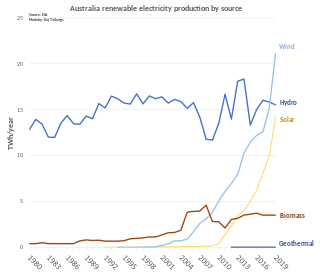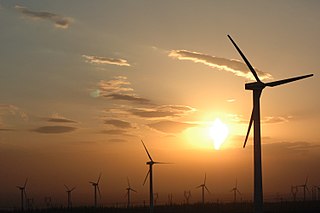
NV Energy is a public utility which generates, transmits and distributes electric service in northern and southern Nevada, including the Las Vegas Valley, and provides natural gas service in the Reno–Sparks metropolitan area of northern Nevada. Based in Las Vegas, Nevada, it serves about 1.3 million customers and over 40 million tourists annually.

Renewable energy in Australia includes wind power, hydroelectricity, solar photovoltaics, heat pumps, geothermal, wave and solar thermal energy.

China is the world leader in wind power generation, with the largest installed capacity of any nation and continued rapid growth in new wind facilities. With its large land mass and long coastline, China has exceptional wind power resources: Wind power remained China's third-largest source of electricity at the end of 2021, accounting for 7.5% of total power generation.

NextEra Energy Resources, LLC (NEER) is a wholesale electricity supplier based in Juno Beach, Florida. NEER is a subsidiary of NextEra Energy, a Fortune 200 company. Prior to 2009, NextEra Energy Resources was known as FPL Energy.

Solar power in Pakistan became part of the energy mix in 2013, following government policies aimed at supporting renewable energy development. Benefiting from nine and a half hours of sunlight daily, the country now has seven solar projects that contribute 530 MW to the national grid. Rising electricity costs and grid reliability concerns have driven industries, businesses, and urban homeowners to increasingly turn to solar solutions, including rooftop photovoltaic installations.

As of 2019, renewable energy in Morocco covered 35% of the country’s electricity needs.
Copperton was a mining town in the central Karoo region of South Africa. As a copper and zinc-mining area, Copperton saw its heyday between 1970 and the end of the 20th century, when it housed about 3,000 workers and their families; amenities included a school and recreation facilities, including a golf course.
Renewable energy in Russia mainly consists of hydroelectric energy. Russia is rich not only in oil, gas and coal, but also in wind, hydro, geothermal, biomass and solar energy – the resources of renewable energy. Practically all regions have at least one or two forms of renewable energy that are commercially exploitable, while some regions are rich in all forms of renewable energy resources. However, fossil fuels dominate Russia’s current energy mix, while its abundant and diverse renewable energy resources play little role.

In 2018, Nigeria's primary energy consumption was about 155 Mtoe. Most of the energy comes from traditional biomass and waste, which accounted for 73.5% of total primary consumption in 2018. The rest is from fossil fuels (26.4%) and hydropower.

Solar power in South Africa includes photovoltaics (PV) as well as concentrated solar power (CSP). In 2016, South Africa had 1,329 MW of installed solar power capacity. Installed capacity is expected to reach 8,400 MW by 2030.

Most of Kenya's electricity is generated by renewable energy sources. Access to reliable, affordable, and sustainable energy is one of the 17 main goals of the United Nations’ Sustainable Development Goals. Development of the energy sector is also critical to help Kenya achieve the goals in Kenya Vision 2030 to become a newly industrializing, middle-income country. With an installed power capacity of 2,819 MW, Kenya currently generates 826 MW hydroelectric power, 828 geothermal power, 749 MW thermal power, 331 MW wind power, and the rest from solar and biomass sources. Kenya is the largest geothermal energy producer in Africa and also has the largest wind farm on the continent. In March 2011, Kenya opened Africa's first carbon exchange to promote investments in renewable energy projects. Kenya has also been selected as a pilot country under the Scaling-Up Renewable Energy Programmes in Low Income Countries Programme to increase deployment of renewable energy solutions in low-income countries. Despite significant strides in renewable energy development, about a quarter of the Kenyan population still lacks access to electricity, necessitating policy changes to diversify the energy generation mix and promote public-private partnerships for financing renewable energy projects.
Mulilo Renewable Energy is a South African company operating in the utility scale energy market in South Africa.
De Aar Solar Power is located 6 km outside the town of De Aar in the Northern Cape Province of South Africa. The facility is based on over 100 hectares of Emathanjeni Municipal land, and comprises 167,580 solar (PV) panels. De Aar Solar Power supplies Eskom with 85,458 MWh of renewable electrical energy per year; enough to power more than 19 000 average South African households.

Bank of Industry Limited is Nigeria's oldest and largest Development Finance Institution (DFI) currently operating. It is owned by the Ministry of Finance Incorporated (MOFI) Nigeria (94.80%), the Central Bank of Nigeria (CBN) (5.19%) and private shareholders (0.01%).

Renewable energy in South Africa is energy generated in South Africa from renewable resources, those that naturally replenish themselves—such as sunlight, wind, tides, waves, rain, biomass, and geothermal heat. Renewable energy focuses on four core areas: electricity generation, air and water heating/cooling, transportation, and rural energy services. The energy sector in South Africa is an important component of global energy regimes due to the country's innovation and advances in renewable energy. South Africa's greenhouse gas (GHG) emissions is ranked as moderate and its per capita emission rate is higher than the global average. Energy demand within the country is expected to rise steadily and double by 2025.
Neoen is a French producer of exclusively renewable energy headquartered in Paris, France. Founded in 2008, it develops, finances, builds and operates solar power plants, wind farms and energy storage solutions. As at 30 June 2023, the company's total capacity was 7 GW, made up of 47% solar, 34% wind and 19% battery storage. Neoen aims to attain 10 GW in operation or under construction by 2025.
Linda Mabhena-Olagunju is a South African entrepreneur and businesswoman. She is the founder of DLO Energy Resources Group (Pty) Ltd, an independent power producer (IPP). Mabhena-Olagunju currently serves as the company's chief executive officer.

The Renewable Energy Independent Power Producer Procurement Programme (REIPPPP) is an initiative by the South African government aimed at increasing electricity capacity through private sector investment in solar photovoltaic and concentrated solar, onshore wind power, small hydro, landfill gas, biomass, and biogas. As of 2023, a total of 123 projects have been awarded to the private sector. Private sector investment totalling R256 billion has been committed to the REIPPPP. Four of the six Bid Windows have come online, totalling 6200 MW of installed capacity.
The De Aar 1 Solar Power Station is an 85.26 MW solar power plant in South Africa. The solar farm is owned by South African independent power producer (IPP), Solar Capital (Pty) Limited, a subsidiary of the Phelan Energy Group, which is headquartered in Dubai, United Arab Emirates. The off-taker of the power generated here is Eskom Holdings, the national electricity parastatal company, under a 20-year power purchase agreement (PPA).












